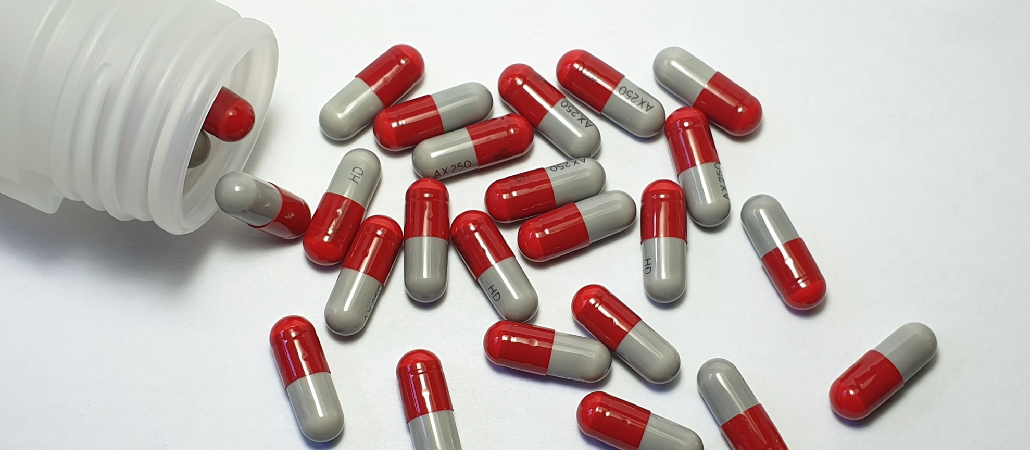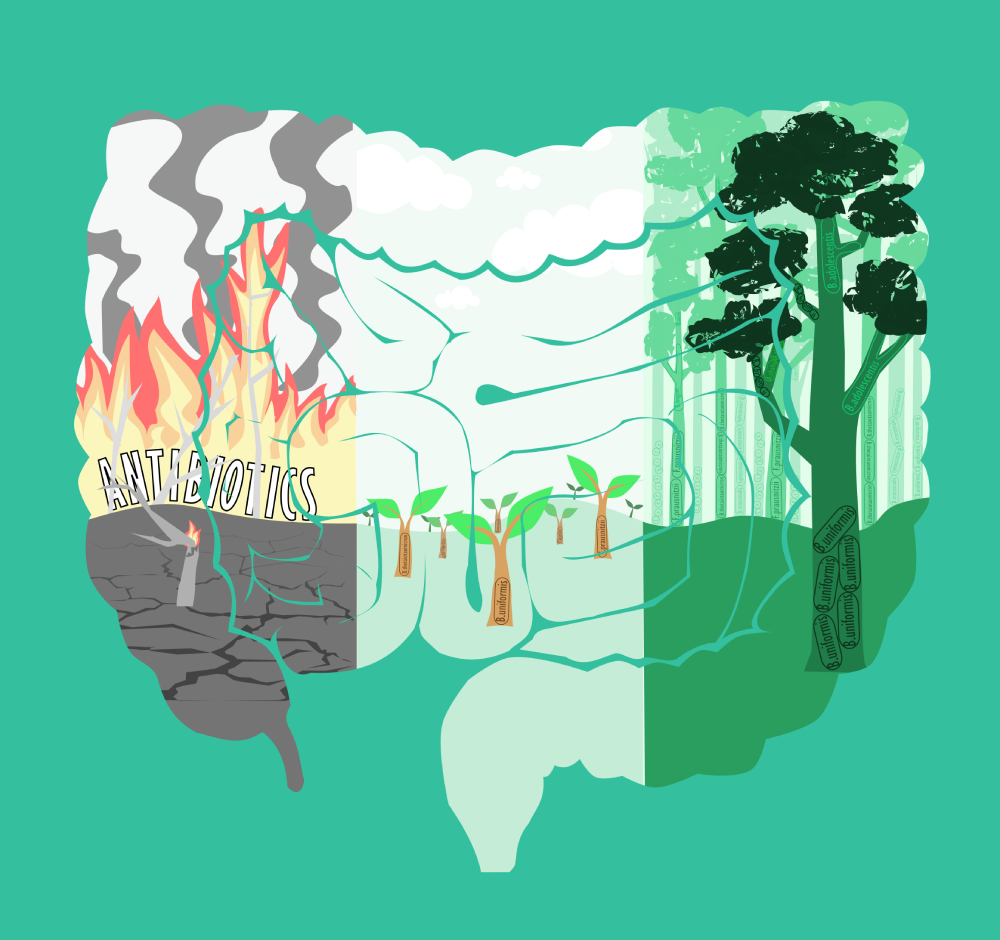A*STAR NEWS
PRESS RELEASES
Why some patients recover faster from the side effects of antibiotic treatment
Discovery of gut bacteria critical to restoring gut health offers new insights into microbiome recovery after antibiotic treatment

Antibiotics are some of the most widely used drugs, yet their side effects on gut bacteria are not fully understood (Copyright: A*STAR’s Genome Institute of Singapore)
Singapore – A team of scientists from the Agency for Science, Technology and Research’s (A*STAR) Genome Institute of Singapore (GIS) and the National University of Singapore (NUS) Yong Loo Lin School of Medicine has identified the microbial factors underlying the response of the gut microbiome to antibiotic treatment. The study discovered a small set of gut bacteria strongly linked to gut microbiome recovery after antibiotic treatment. This discovery is critical in mitigating the side effects of antibiotic treatment and its associated long-term health consequences. Findings from this study were published in the June issue of Nature Ecology and Evolution.
Antibiotics are one of the most commonly used drugs in healthcare, with billions of doses consumed around the world every year. Several studies have shown that repeated consumption of antibiotics in different stages of life disrupts the normal microbiome in our bodies, and increases the risk for various diseases (eg. diabetes, obesity, atopic dermatitis)1. Yet despite the high consumption rate of antibiotics, the side effects of its usage and associated long-term health consequences have been understudied.
In this study, the team analysed hundreds of gut microbiome profiles of patients from three different countries. They investigated why healthy bacterial communities in the gut recover better in some individuals after antibiotic treatment, but remain disrupted for others.
Dr Niranjan Nagarajan, Associate Director and Group Leader at GIS, commented, "Our guts harbour billions of bacteria, forming an ecosystem that serve as an additional ‘organ’ for our body. This ecosystem is supported by what we eat, but can also be destroyed by the antibiotics that we consume. The impact of antibiotics on the gut microbiome is similar to how a forest fire wreaks havoc on its flora and fauna. The recovery of a forest’s ecosystem is dependent on its food-web relationships and the presence of certain key species. The same is also true for the gut microbial ecosystem."
“Our study reports the first attempt to reconstruct a gut bacterial ‘food-web’ from microbiome data, and has identified a small set of bacteria critical to its recovery post antibiotic treatment. This discovery challenges a dogma in the field that recovery of the gut microbiome is primarily due to antibiotic resistance and repopulation. It presents a different perspective to existing studies, and provides a new paradigm for studying microbiome recovery,” added Dr Nagarajan.
Bacteria that promote recovery of the gut microbiome are enriched with enzymes which degrade a wide range of host and diet-derived carbohydrates. They serve as the primary producers (akin to plants in macro-ecology) of the gut ecosystem to harvest energy for other bacteria. Their presence rapidly re-establishes the gut microbial food-web after antibiotic treatment, and boosts the recovery of a diverse, healthy microbial community.
Prof Patrick Tan, Executive Director of GIS, said, “The synergy between different types of gut bacteria that promote recovery is an exciting direction of research. It needs to be further explored to protect our bodies from the side effects of antibiotic usage. The team is working on follow-up projects that aim to further characterise the mechanisms and synergies involved in gut microbiome recovery. In time, we hope to promote this recovery through consumption of appropriate pre- and probiotics.”

Recovery of gut microbial ecology is analogous to recovery after a forest fire (Copyright: A*STAR’s Genome Institute of Singapore)
– END –
1 ncbi.nlm.nih.gov
Enclosed:
About A*STAR's Genome Institute of Singapore (GIS)
The Genome Institute of Singapore (GIS) is an institute of the Agency for Science, Technology and Research (A*STAR). It has a global vision that seeks to use genomic sciences to achieve extraordinary improvements in human health and public prosperity. Established in 2000 as a centre for genomic discovery, the GIS will pursue the integration of technology, genetics and biology towards academic, economic and societal impact.
The key research areas at the GIS include Human Genetics, Infectious Diseases, Cancer Therapeutics and Stratified Oncology, Stem Cell and Regenerative Biology, Cancer Stem Cell Biology, Computational and Systems Biology, and Translational Research.
The genomics infrastructure at the GIS is utilised to train new scientific talent, to function as a bridge for academic and industrial research, and to explore scientific questions of high impact.
For more information about GIS, please visit https://www.a-star.edu.sg/gis.
About the Agency for Science, Technology and Research (A*STAR)
The Agency for Science, Technology and Research (A*STAR) is Singapore's lead public sector agency that spearheads economic oriented research to advance scientific discovery and develop innovative technology. Through open innovation- we collaborate with our partners in both the public and private sectors to benefit society.
As a Science and Technology Organisation- A*STAR bridges the gap between academia and industry. Our research creates economic growth and jobs for Singapore- and enhances lives by contributing to societal benefits such as improving outcomes in healthcare- urban living- and sustainability.
We play a key role in nurturing and developing a diversity of talent and leaders in our Agency and Research Institutes- the wider research community and industry. A*STAR oversees 18 biomedical sciences and physical sciences and engineering research entities primarily located in Biopolis and Fusionopolis. For ongoing news, visit www.a-star.edu.sg.
ANNEX A – NOTES TO EDITOR
The research findings described in this media release can be found in the scientific journal Nature Ecology and Evolution, under the title, “Metagenome-wide association analysis identifies microbial determinants of post-antibiotic ecological recovery in the gut” by Kern Rei Chng1*, Tarini Shankar Ghosh1,2*, Yi Han Tan3*, Tannistha Nandi1*, Ivor Russel Lee3, Amanda Hui Qi Ng1, Chenhao Li1, Aarthi Ravikrishnan1, Kar Mun Lim1, David Lye3,4,5,6, Timothy Barkham6, Karthik Raman7, Swaine L Chen1, Louis Chai3,8, Barnaby Young4,5,6#, Yunn-Hwen Gan3#, Niranjan Nagarajan1,3#
- Genome Institute of Singapore, Singapore 138672, Singapore
- APC Microbiome Ireland, University College Cork, Ireland, T12K8AF
- Yong Loo Lin School of Medicine, National University of Singapore, Singapore 117596, Singapore
- National Centre for Infectious Disease, Singapore 308433, Singapore
- Lee Kong Chian School of Medicine, Nanyang Technological University, Singapore 308232, Singapore
- Tan Tock Seng Hospital, Singapore 308433, Singapore
- Department of Biotechnology, Indian Institute of Technology (Madras), Chennai 600036, India
- Division of Infectious Diseases, University Medicine Cluster, National University Health System, Singapore 119228, Singapore
*Joint First Authors
#Corresponding Authors
Lead Contact: nagarajann@gis.a-star.edu.sg
Was This Article Helpful?
A*STAR celebrates International Women's Day

From groundbreaking discoveries to cutting-edge research, our researchers are empowering the next generation of female science, technology, engineering and mathematics (STEM) leaders.
Get inspired by our #WomeninSTEM
